Tidbits - Feb. 20, 2020 - Reader Comments: Nevada, Medicare 4 All, Stop Bernie Campaign, Culinary Workers, Pittsburgh AFL-CIO; Economy a Bust; NYC School Segregation, Corporate Schooling; Black History, Civil War, Reconstruction; Labor Notes; announcement

Re: Election 2020: Transformation or Stability? (Claire O'Connor)
ACQUITTAL -- cartoon by Rob Rogers
Re: These 3 Charts Show How Trump’s ‘Blue Collar Boom’ is More of a Bust for U.S. Workers (Burch Brown; William Leffingwell; Steve Collins)
Re: The Night Socialism Went Mainstream (Earl Scott)
What is socialism to me? -- poem by Stewart Acuff
Bernievirus -- cartoon by Robert Ariail
TrumpCare
Re: Pittsburgh AFL-CIO Opposes 1st Black Woman State Rep from Western PA for Re-Election (Marge Krueger; Michael Calhoun; Daniel Millstone; Sonia Collins; Alan Barnes; April Humphrey; Frank Richards)
Re: Culinary Union Suggests Sanders, Warren, Asking Union Members to Trade Health Plans for "Promises" (Gregory Kestel; Bob Feb; Pablo Schwartz; Jason D Capell)
Re: Why Is Nevada’s Most Powerful Union Turning on Bernie Sanders? (Alan Hart; Yvonne Maisonette-Laboy; Jan Scarborough; Ken Ulfeld Olsen; Rick Van Heel)
Re: Why Would A Union Oppose Medicare For All? (Leonard Polletta)
Re: Turning Up the Pressure for Integration, NYC Students Plan Citywide School Boycott (Robert Maldonado; Rosin Lopez; Emma Melendez)
Re: How Corporations Are Forcing Their Way Into America’s Public Schools (Kentucky Alliance Against Racist and Political Repression)
From Slavery to Mass Incarceration (Ben & Jerry's)
The Second Founding: How the Civil War and Reconstruction Remade the Constitution - Book Review (Chuck Idelson)
Re: Homer Plessy, Who Sat on a Train and Stood Up for Civil Rights (Victor M.carreras Roena; Hugo Cunningham)
Re: On the 100th Anniversary of the Negro Leagues, a Look Back at What Was Lost (William Luna)
Re: Who’s at Fault for Cuba’s Economic Problems? (Ed Griffin; Juan Flores)
Re: Mexico Is Showing the World How to Defeat Neoliberalism (Mateo Owen)
New UAW Reform Movement (Asar Amenra)
Communities Across the Nation Reject Trump Administration’s Intention to Create a White Nationalist Immigration System (Asian Pacific American Labor Alliance - APALA)
Announcements:
Two Months til Labor Notes! Early-Bird Rate Expires Soon
Book Talk - Democratic Socialism, American Style: "We Own The Future" Discussion & Free Lunch - Washington, DC - February 25 (The American Prospect)
Puerto Rican Activism from New York to San Juan - and Beyond - New York - February 25 (Museum of the City of New York)
Migrant Justice is Climate Justice: A Series on the Green New Deal - New Brunswick, NJ - February 25 (The LEAP)
The Black Radical Tradition - #AAIHS2020 Conference - University of Texas at Austin - March 6 - 7 (African American Intellectual History Society)
2020 NEH Institute on the Grassroots History of Civil Rights Movement - Duke University in Durham, North Carolina - July 6 – 24 (Teaching for Change)
Re: Election 2020: Transformation or Stability?
WOW! This article should be a must-read for every U.S. citizen. As usual, the way forward is through the cloud of b.s. meant to confuse and misdirect. This article provides the clarity we can all use. Let's help others through the cloud of misdirection. Thanks Ruth Connif
Claire O'Connor
ACQUITTAL -- cartoon by Rob Rogers

Rob Rogers
February 7, 2020
robrogers.com
Re: These 3 Charts Show How Trump’s ‘Blue Collar Boom’ is More of a Bust for U.S. Workers
Of course the blue collars didn't benefit. We're in the middle of corporate socialism where only the extreme wealthy benefit. They NEVER pay for business setbacks, only the laborers, with cut hours, benefits, layoffs, etc. The good ole boys at the top continue to collect their millions and enjoy their tax breaks.
Burch Brown
Posted on Portside's Facebook page
=====
Now, the task is to get Trump voters to accept reality.
William Leffingwell
Posted on Portside's Facebook page
=====
This article is interesting, especially, if you think wages has gone up. Click on this article for the true facts about the wage boom.
Steve Collins
Posted on Portside's Facebook page
Re: The Night Socialism Went Mainstream
True, but the DNC will try to steal it from him and people that voted for him. The convention was rigged last time and big money talks. Remember 1944 and how Wallace was removed from the ticket. So onward for Bernie Sanders.
Earl Scott
Posted on Portside's Facebook page
It's the electricity that turned on the lights, radio and TV
In Granpa Dandy's house in West Tennessee
Fighting for our rights collectively
So life meant more than cotton and sharecropping to my family and me
The bridge at Caruthersville connecting my family across the Mississippi
Free education and state college to open the mind God gave me
Medicare, a pension and Social Secirity
So there is life in old age instead of sickness and death so early
It's the roads I drove and highways I hitchhiked
From Alabama to New Hampshire where my heart led to Missouri and Tennessee
It's the hope for more than work for Sam and Sydney
Its the prayer of a loving daddy
Stewart Acuff
Bernievirus -- cartoon by Robert Ariail
Robert Ariail
February 11, 2020
Chronicle-Tribune (Marion, Indiana)

Re: Pittsburgh AFL-CIO Opposes 1st Black Woman State Rep from Western PA for Re-Election
(posting on Portside Labor)
I am a member and Vice President of the Allegheny Co labor council. I am very disturbed with the article you wrote. You were not at the interview to her response to the Unions or her presentation. I take offense to the slant that there was some racial intent. Unions voted for the best interest of their members and working families in that district . I see no purpose to highlight the difference in opinion between unions.
Marge Krueger
=====
They oppose her because she is TOO POSITIVE for them...PERIOD!!!
Michael Calhoun
Posted on Portside's Facebook page
=====
We are going to be divided or at least imperfectly united. Here Mike Elk reports on an election in western Pennsylvania in which a key issue is fracking. The AFL-CIO council supports fracking with gusto and is spending big bucks to unseat a black progressive woman. Many of us including PA state rep Lee oppose fracking. These divisions are difficult and must be faced directly. How do we ensure good green jobs as we stop fracking? The Green New Deal. Thanks to Portside for sending this along.
Daniel Millstone
Posted on Portside's Facebook page
=====
I hate to say it but the AFL-CIO is wrong here. Have their leaders been bought off in some way by the coal operators? The Green New Deal is the best hope for a future for the mining communities of Appalachia.
Sonia Collins
Posted on Portside's Facebook page
=====
Within the American labor movement, the Building Trades unions have always been conservative in general & racially-exclusionary in particular. They’ve also served as a locus for corruption, though that’s a separate issue from this one. This young, progressive, Pennsylvania, African-American politician is fighting for reelection. She has the support of more liberal unions, but she’s opposed, vociferously, by the old guard of construction union leaders, who (to be generous) fail to see the bigger picture, & hold tremendous sway within the state AFL-CIO. She’s extremely popular, but she’s facing serious opposition from big-money interests & retrograde union leaders. She deserves our support, too.
Alan Barnes
Posted on Portside's Facebook page
=====
Labor isn't always on the right side of every issue. There's self preservation, right? I miss the promise of the Apollo Alliance, the Blue & Green movements working together for better jobs and a clean energy future.
April Humphrey
Posted on Portside's Facebook page
=====
Disgusting... union racism is still racism
Frank Richards
Posted on Portside's Facebook page
(posting on Portside Labor)
Just because their union has health insurance plan for one contract won’t guarantee it for the next. Almost all union health plans are getting cut back, either with less coverage, more cost or higher co-pay. And let’s talk about retirees - no guarantee.
Gregory Kestel
Posted on Portside's Facebook page
=====
To all union members. I know how much you fought for your health insurance, but if we have M4A, then you can fight for better wages and pensions. Don't forget that a lot of companies once you retire there goes your health insurance. Specially once you turn 65.
Bob Feb
Posted on Portside's Facebook page
=====
(Baron Harkonnen stunt double Sheldon Adelson leans on culinary union ..)
Pablo Schwartz
Posted on Portside's Facebook page
=====
First of all, this is just one of UNITE HERE’s locals. The LA local gave a dual endorsement of Sanders and Warren. The reality is that the UNITE HERE health “plan” is unsustainable; it depends completely on convincing multiple employers to re-up their funding of the “plan” every few years. It’s also funded through, in simple terms, is a tax on each hour worked ... money that could otherwise go to wages if we had Medicare For All.
Jason D Capell
Posted on Portside's Facebook page
Re: Why Is Nevada’s Most Powerful Union Turning on Bernie Sanders?
Culinary 226 is a model of a fighting union. But they’re wrong on Medicare for All.
Strike Wave
February 13, 2020
Alan Hart
Posted on Portside's Facebook page
=====
"Let’s also be clear about what is happening: top leaders of Local 226 are taking a conservative position and harming the whole labor movement in the process. That Local 226 is a powerful and important union makes this all the more tragic. Rather than engage with the pro-worker frontrunner on his plan, they are poisoning the well for workers everywhere." ??
Yvonne Maisonette-Laboy
Posted on Portside's Facebook page
=====
This just makes me incredibly sad.
Jan Scarborough
Posted on Portside's Facebook page
=====
Why do you guys think Trump won 4 years ago?
Because a LOT of workers didn't vote, for what was best for them!!!
Ken Ulfeld Olsen
Posted on Portside's Facebook page
=====
I do like Bernie and I know we have to go to a national insurance plan at some point. Obama had a veto proof congress and was able to pass Obama Care followed by hundreds of lawsuits and Republican laws being passed that turned it into a caricature of the original bill. Can someone tell me how Bernie is gonna be able to pass and keep Medicare for All?
Rick Van Heel
Posted on Portside's Facebook page
Re: Why Would A Union Oppose Medicare For All?
(posting on Portside Labor)
A wonderful statement supporting Medicare For All.
Leonard Polletta
Posted on Portside's Facebook page
Re: Turning Up the Pressure for Integration, NYC Students Plan Citywide School Boycott
This stuff is still going on in the 21 century? And now with Mayor DiBlasio,you got to be kidding??
Him, of all people?
Robert Maldonado
PPosted on Portside's Facebook page
=====
And they say there is no segregation.
Rosin Lopez
Posted on Portside's Facebook page
=====
This has been going on for decades. It is indeed shameful.
Emma Melendez
Posted on Portside's Facebook page
Re: How Corporations Are Forcing Their Way Into America’s Public Schools
In the expanding effort to privatize the nation’s public education system, an ominous, less-understood strain of the movement is the corporate influence in Career and Technical Education (CTE) that is shaping the K-12 curriculum in local communities.
An apt case study of the growing corporate influence behind CTE is in Virginia, where many parents, teachers and local officials are worried that major corporations including Amazon, Ford and Cisco—rather than educators and local, democratic governance—are deciding what students learn in local schools.
Kentucky Alliance Against Racist and Political Repression
Posted on Portside's Facebook page
From Slavery to Mass Incarceration
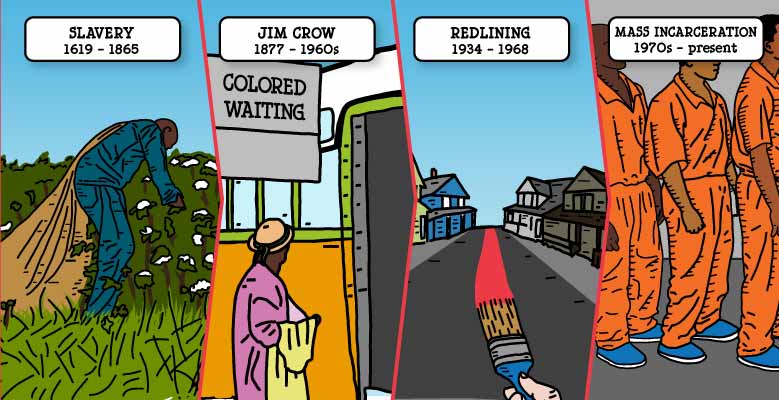
Ben & Jerry's
August 23, 2019
The Second Founding: How the Civil War and Reconstruction Remade the Constitution
In the wake of the obvious, but still dismal, finale of the impeachment trial, it’s worth reflecting on how we got here, and some clues on how we can escape from of the train wreck of our collapsing democracy.
In his latest triumph “The Second Founding: How the Civil War and Reconstruction Remade the Constitution,” Eric Foner reminds us of an all too brief moment when we were taking steps toward “creating the world’s first biracial democracy” buttressed with Constitutional amendments intended to enforce and protect what W.E.B. DuBois called “a key moment in the history of democracy.”
As first DuBois, then other historians, from Foner to recently Henry Louis Gates, have chronicled how a horrified former plantation class concluded, as Foner writes, that “to restore white supremacy in Southern public life and ensure planters a reliable labor force for them Reconstruction had to be overthrown.” And did so through a campaign of violence and terrified, sanctioned by the Northern Republican Party and a judiciary that scuttled much of the legal scaffolding of Reconstruction.
Still there’s much to learn from the achievements for both the formerly enslaved millions, and the poor whites who also achieved unprecedented gains from Reconstruction that would have been beyond their wildest dreams in the slavery stained antebellum years.
Professor Michael Kazin has artfully placed “Second Founding” in the library of Foner’s brilliant body of work (see earlier post on Portside).
It’s worth a re-read. Foner’s suggestions on ways the revolutionary 13th, 14th, and 15th amendments, even with their loopholes and flaws, can help our efforts to eradicate the ongoing effects of slavery and Jim Crow and the full throated attack on democracy that is at the heart of the oligarchical stranglehold on our political, economic, social, and cultural system.
The 13th abolished slavery, needed as a Constitutional Amendment to ensure Lincoln’s Emancipation Proclamation could not be simply reversed by a future Presidential executive order – just as we’ve seen the lawless President Trump repeal nearly every executive order issued by President Obama.
Many have documented how the 13ths massive loophole, permitting “involuntary servitude” upon “punishment for a crime” was widely exploited through the Southern expansion of what constituted a crime, and the brutal convict labor and convict leasing structure, up through modern mass incarceration in a racist criminal justice system.
Still, Foner argues, the 13th retains a “latent” constitutional legal power that has “almost never been invoked as a weapon against the racism that forms so powerful a legacy of American slavery.” There’s no reason, he adds, why the 13th “cannot be reinvigorated as a weapon against enduring inequalities rooted in slavery.”
Similarly, the 15th, which mandated the “rights of (male) citizens” to vote “shall not be abridged” by either federal or state action “on account of race, color, or previous condition of servitude” also left open massive abuses by failing to recognize that even as some legislators at the time foresaw how that right “could be rendered void by poll taxes, literacy tests and other ostensibly nonracial requirements.”
Language establishing an affirmative national right to vote could have blunted the machinations of the white supremacists to overturn African American suffrage, and the subsequent court rulings giving them a green light to do so. Without it, even after enactment of the Voting Rights Act of 1965 nearly a century later, the current wave of voter suppression laws would be less likely to have a legal fig leaf as a defense.
One remedy for voter suppression was available in Section 2 of the 14th Amendment which authorized Congress to reduce congressional representation to states that abridge the right to vote. Regrettably, Foner notes, that provision has never “been implemented even when post reconstruction southern governments took the right to vote away” from African Americans. Presumably a legal challenge to all the myriad voter suppression laws could still be formed on that provision.
It is the first part of the 14th with its stipulation of “equal protection of the laws” and “due process” that continues to have the most active utilization for expansion and protection of rights far beyond what most of its authors imagined, from the privacy protections established in Roe v Wade to marriage equality.
However, even the protections of the 14th were hijacked, as corporate lawyers came to dominate the Court and increasingly adapt its protections for corporate abuses, and by more recent rightwing judges who, Foner notes, “when it comes to racial justice” (have) proved more sympathetic to white plaintiffs” alleging reverse discrimination than to African Americans “overcoming the legacies of centuries of slavery and Jim Crow.”
Still, the 14th, rooted in the Constitution that even conservatives profess to view as their guidepost, remains an important instrument. All the Second Founding amendments, suggests Foner, could be significant in an era of escalating racist violence, as well as all the other vestiges of slavery and the overthrow of Reconstruction, including the failure to implement reparations for the formerly enslaved that continue to be at the root of widespread wealth inequality, and discrimination in employment, housing, education and other sectors of society for African Americans today.
None of the legal and economic gains of Reconstruction, like the abolition of slavery itself, as well as every other major reform in U.S. history, including women’s suffrage, labor rights, the Civil Rights movement, and more, were won by broad, persistent movements. Ultimately, the Second Founding amendments can be a valuable supplement for the mass social change movement that has rarely been more urgently needed than to confront the crisis we face today.
Chuck Idelson
Re: Homer Plessy, Who Sat on a Train and Stood Up for Civil Rights
In terms of history, the 1954 case of Brown vs Board of Education happened just the other day. The wheels of justice can be very slow in the USA and the latest judicial appointments in the federal system as well as in the Supreme Court, leave much to be desired.
Victor M.carreras Roena
Posted on Portside's Facebook page
=====
Alternative history might-have-beens: Suppose Robert Todd Lincoln, general counsel of the Pullman Company, had invoked his father's name ( something he never did in real life) and the African-American porters of his own company, in a brief against this latest betrayal?
Hugo Cunningham
Posted on Portside's Facebook page
Re: On the 100th Anniversary of the Negro Leagues, a Look Back at What Was Lost
A Mexican millionaire Jorge Pasquel brought players from the Negro Leagues like Monte Irvin, Josh Gibson and Satchel Paige to play in the Mexican Leagues.They got their experience as players and managers to be able to break into the American baseball leagues.Black Cuban players also played in Mexico. If you read you can learn from a book entitled South of the Color Barrier by John Virtue.
William Luna
Posted on Portside's Facebook page
Re: Who’s at Fault for Cuba’s Economic Problems?
USA, aren't you proud? I've gone to Cuba and met some of the ordinary people there. They don't deserve this abuse
Ed Griffin
Posted on Portside's Facebook page
=====
I understood the mentality back during the Cuban missile crisis but this is too much now. I think it’s time to lift it. I think the rest of the world agrees
Juan Flores
Posted on Portside's Facebook page
Re: Mexico Is Showing the World How to Defeat Neoliberalism
Is it really? Rather than turn Banco de México into a publicly accountable bank, AMLO is constructing a parallel public banking system, avoiding class conflict in favour of private-public partnerships...
What sort of "Fourth Transformation" is this?
Mateo Owen
I am one of the co-founders of a New reform movement being initiated inside of the UAW, named Unite All Workers For Democracy (UAWD), https://uawd.org/
The UAWD is trying to spread the word in the progressive community, that the rank and file is preparing to organize and fight back to take control of our union from corrupt union officials.
In Struggle and Solidarity,
Asar Amenra
J.D. Labor and Civil Rights Organizer

Communities Across the Nation Reject Trump Administration’s Intention to Create a White Nationalist Immigration System
Kushner’s immigration proposal is a direct attack on family immigration
Washington, DC - Value Our Families, a national coalition of organizations seeking to strengthen the U.S. family-based immigration system, issues the following statements in response to President Trump's senior adviser Jared Kushner’s intention to overhaul the U.S. immigration system towards an agenda rooted in white nationalism that tears families apart. Kushner’s plan would replace our family reunification visa system and diversity visa program with an arbitrary points based system favoring the wealthy.
Megan Essaheb, Director of Immigration Advocacy, Asian Americans Advancing Justice: “We reject Trump’s attempt to whitewash his administration’s cruel policies - stripping immigrants of due process rights, instilling fear in communities, violently separating children from their families and using dehumanizing rhetoric - with his anti-family immigration proposal. We should continue to prioritize family and humanitarian values and continue to offer opportunities to those seeking refuge from violence, persecution or poverty. Families lift each other up. Indeed, yesterday’s struggling dad is today’s successful chef, builder, scientist, or restaurant owner. And for each success story there are many more caregivers and workers who made their success possible. There are so many examples of immigrants who have uplifted neighborhoods throughout our nation thanks to our tradition of family-based visas. We cannot let Trump destroy America’s soul.”
Sam Yu, Communications Coordinator, NAKASEC: “As a result of family-based immigration, my grandmother was able to come to the U.S. and stay home with me and my sisters while my parents worked at their small business, morning to night, six days a week. My grandmother ensured that we went to school prepared and were healthy and safe. The kind of points-based system that is being considered would have excluded women like my grandmother. We need a stronger family-based immigration system through the Reuniting Families Act that supports keeping families together and small businesses, not a system that will ultimately favor wealthy men."
Alvina Yeh, Executive Director of the Asian Pacific American Labor Alliance, AFL-CIO: “This plan does nothing to address the crisis of families being separated and children being locked up. It addresses none of the continuing anti-Blackness and islamophobia we've seen from this administration. It does nothing to uplift working people and their families who are the backbone of our country and our economy. This points-based immigration plan would only exacerbate the exploitation of immigrant workers on employment visas, who already face hostile working conditions.”
Reverend John L. McCullough, President and CEO of Church World Service: “This plan is a monstrosity that lacks moral clarity and is an affront to our nation’s values of family unity and welcome. The administration’s plan is little more than a thinly veiled attempt to limit immigration to the privileged and wealthy - in effect closing our borders to all except those who the president and his cabinet prefer. The U.S. immigration system should be rooted in compassion, not in cold partiality. We must do more as families are being torn apart and lives are at stake.”
Angelica Salas, Executive Director of the Coalition for Humane Immigrant Rights (CHIRLA): “The Trump administration’s capacity to disregard common-sense immigration policies continues to amaze us. From its founding, this nation has honored and welcomed the contributions of all who seek a better life for themselves and their families. Only now is this cynical administration with eyes only for the white and wealthy choosing to exchange those values for a wealth-based system. It should not and will not happen.”
Sameera Hafiz, Policy Director of the Immigrant Legal Resource Center: “As the Trump administration continues doubling down on their racist immigration policy agenda, including beginning implementation of the new public charge rule and the expansion of the Muslim ban, there is no question that this new proposal is simply the latest part of the Trump administration’s coordinated and racist effort to limit immigration to the wealthy and white. Family builds resilience and is a core human value, as reflected in the idea of family-based immigration - the heart of the American immigration system. We call on Congress to support the Reuniting Families Act so that all who come here are given a fair opportunity to succeed and contribute their talents alongside their loved ones.”
Value Our Families is a national coalition of organizations seeking to strengthen the U.S. family-based immigration system. Visit: ValueOurFamilies.org
CONTACT: Value Our Families, 202.787.1813 Natali@mateaGroup.com
The Asian Pacific American Labor Alliance (APALA), AFL-CIO was founded in 1992 as the first and only national organization for Asian American and Pacific Islander (AAPI) union members to advance worker, immigrant and civil rights. Learn more at www.apalanet.org.
Two Months til Labor Notes! Early-Bird Rate Expires Soon
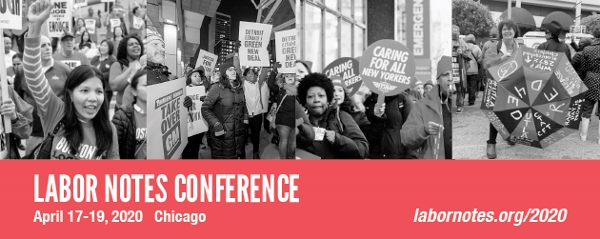
The Labor Notes Conference is just two months away! Register by February 28 at labornotes.org/2020 to get the special early-bird rate of $115 ($45 off the regular price of $160).
Round up a group of fellow union members or local labor activists and join us in Chicago to swap solidarity, inspiration, and strategies with thousands of other workers from across the country and the globe!
WHEN: Friday, April 17, 9 a.m. - Sunday, April 19, 3 p.m.
WHERE: Hyatt Regency O'Hare, Chicago, Illinois
DETAILS: Visit labornotes.org/2020 or call (718) 284-4144.
EARLY BIRD SPECIAL!: Registration just $115 ($45 off the regular price of $160) until February 28!
Tickets for the fundraising banquet are sold separately; get yours here.
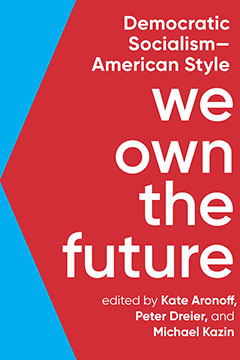
We Own The Future:
Book Discussion and Luncheon
Join us at noon Tuesday, February 25, 2020,
at The American Prospect headquarters,
1225 Eye St NW, Suite 600, Washington, D.C. 20005
Lunch is free! Signed books available at the event.
CLICK HERE TO RSVP AND/OR RESERVE YOUR BOOK
We Own the Future: Democratic Socialism–American Style gives readers a practical vision of a future that is more democratic, egalitarian, inclusive, and environmentally sustainable. The book includes a crash course in the history and practice of democratic socialism, a vivid picture of what democratic socialism in America might look like in practice, and compelling proposals for how to get there from the age of Trump and beyond. With contributions from some of the nation's leading political activists and analysts, We Own the Future articulates a clear and uncompromising view from the left. Edited by Kate Aronoff, Peter Dreier, and Michael Kazin.
Join four of the contributors for a discussion, q & a, and book signing. A light lunch is included.
FEATURING:
David Dayen (Building the People's Banks) is the executive editor of The American Prospect. His first book, Chain of Title: How Three Ordinary Americans Uncovered Wall Street's Great Foreclosure Fraud, winner of the Studs and Ida Terkel Prize, was released by The New Press in 2016.
Michael Kazin (How Socialists Changed America) is a professor of history at Georgetown University and a co-editor of Dissent magazine.
Robert Kuttner (Confronting Corporate Power) is a professor at Brandeis University's Heller School and co-founder of The American Prospect.
Harold Meyerson (How Socialism Surged, and How It Can Go Further) is editor at large of The American Prospect and an op-ed contributor to the Los Angeles Times.
Moderated by Thea Lee, the president of the Economic Policy Institute and co-author of The Field Guide to the Global Economy.
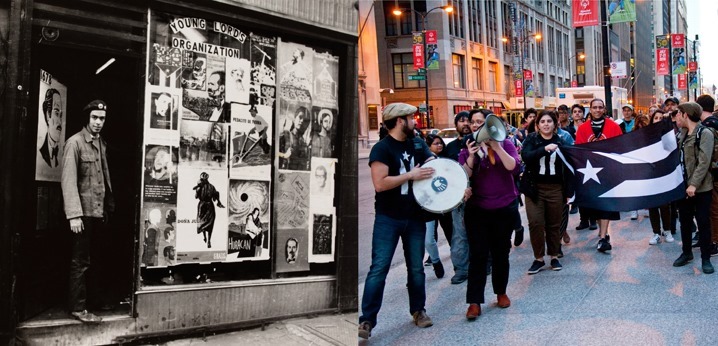
photo by Charles Edward Miller via Flickr Creative Commons // Museum of the City of New York
Tuesday, February 25, 2020 at 6:30 PM – 8:30 PM
Museum of the City of New York
1220 Fifth Ave at 103rd Street
New York, New York 10029
$15 Adults | $12 Seniors, Students, and Educators (with ID) | $10 Museum Members
Tickets here
The activist work of the Young Lords Party continues to be a point of reference for contemporary activists both in New York City and the island of Puerto Rico. Nowhere is this clearer than in current efforts within the Puerto Rican diaspora to support progressive struggles in the island. Historically, these bridges of solidarity have proven both invaluable and fraught, as activists navigate the here and there, their intersecting identities, and the diverging histories of their communities. Johanna Fernández, author of the forthcoming book, Young Lords: A Radical History (February, 2020), sits down for a conversation about activism, diasporas, and decolonization with activist, organizer, and researcher Pablo Benson-Silva, filmmaker, writer, and scholar Frances Negrón-Muntaner, former Young Lord Mickey Melendez, and Monxo López, the Andrew W. Mellon Foundation Post-Doctoral Fellow at the Museum of the City of New York.
About the Speakers:
Pablo Benson-Silva is an activist, organizer, and researcher born and raised in San Juan, Puerto Rico that moved to New York City more 14 years ago. He has been involved in many projects that span from Occupy Wall Street, the Puerto Rican Mutual Aid Network, Fearless Cities, and the worker cooperative movement. He is also a partner at Movement Netlab, a think-do-learn tank on network social movements. Since summer 2017, Benson-Silva has served on the Board of Directors of the U.S. Federation of Worker Cooperatives and is director of membership for the NYC Network of Worker Cooperatives. He studied sociology at the University of Puerto Rico and at the New School for Social Research and more than occasionally dabbles in teaching.
Johanna Fernández teaches 20th Century U.S. history, the history of social movements, the political economy of American cities, and African-American history in the Department of History at Baruch College (CUNY). She is the author, editor, and co-editor of multiple books and journals, including Young Lords: A Radical History (February, 2020) and Writing on the Wall: Selected Prison Writings of Mumia Abu-Jamal (2015). She directed and co-curated the exhibition ¡Presente! The Young Lords in New York at the Bronx Museum of the Arts, El Museo del Barrio, and Loisaida Inc. Fernández’s writing has appeared in many publications including Al Jazeera, The New York Times, NPR, and The Wall Street Journal. Her awards include the Fulbright Scholars grant to the Middle East and North Africa and a National Endowment for the Humanities Fellowship of the Scholars-in-Residence program at the Schomburg Center for Research in Black Culture of the New York Public Library.
Miguel “Mickey” Melendez, author of We Took the Streets (2003), has a master's degree in public administration and has held executive positions in the New York City Health and Hospital Corporation, Housing Authority, and Department of Education. Melendez has also taught in the Hispanic Studies Department at Baruch College and is currently a professor at John Jay College of Criminal Justice. As a former Young Lord, he remains a committed activist for Puerto Rican rights.
Frances Negrón-Muntaner is a filmmaker, writer, scholar and professor at Columbia University, where she is also the founding curator of the Latino Arts and Activism Archive. Among her books and publications are The Latino Media Gap (2014), and Sovereign Acts: Contesting Colonialism in Native Nations and Latinx America (2017). Her most recent films include War for Guam (2015) and Life Outside (2016). She has received multiple awards and fellowships, including Ford and Pew fellowships, the Lenfest Award (2012), and inaugural OZY Educator Award (2017). In 2008, the United Nations' Rapid Response Media Mechanism recognized her as a global expert in the areas of mass media and Latin/o American studies. She launched Valor y Cambio, in 2019, an art, digital storytelling and just economy project in Puerto Rico (valorymcambio.org) which was awarded the 2019 Premio Borimix from the Society for Educational Arts in New York.
Monxo López (moderator) is a researcher, educator, cartographer, and South Bronx-based urban activist. He is currently a Mellon Foundation Fellow at the Museum of the City of New York, and was a Mapping Fellow at the Design Trust for Public Spaces. He is also a founding member of South Bronx Unite (a local environmental justice organization), as well as a founding and board member of the Mott Haven/Port Morris Community Land Stewards, the local Community Land Trust. López holds a Ph.D. in political science from CUNY’s Graduate Center. He grew up in Puerto Rico, and currently lives in Mott Haven, the South Bronx.
This program is inspired by our ongoing Activist New York exhibition. To view all the programs in the series, click here.
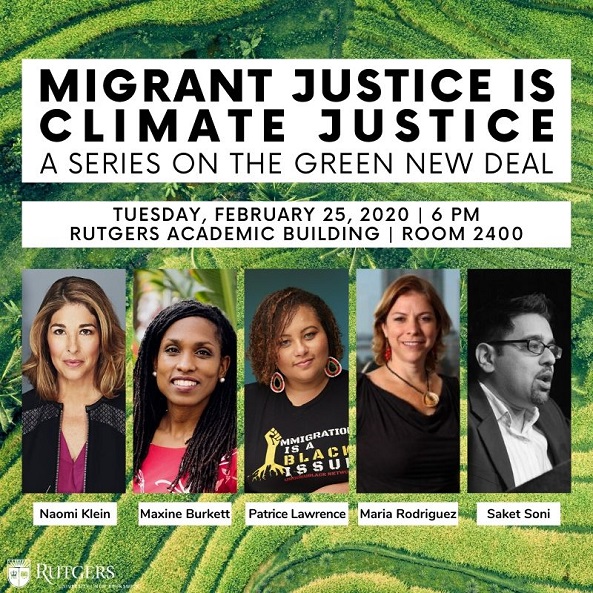
We’re one week away from my next event at Rutgers University: “Migrant Justice is Climate Justice.” Register now to save a spot!
These struggles simply cannot be separated. From valuing the low-carbon labor that so many migrants already do, to paying our climate debts and welcoming climate refugees, this event will explore how the Green New Deal can and must put migrant communities at the center. I couldn’t be more excited about our lineup of speakers — you won’t want to miss this event.
When: Tuesday February 25, 2020 at 6:00 PM – 7:30 PM EST
Where: Rutgers Academic Building, Room 2400, 15 Seminary Pl, New Brunswick, NJ 08901
With:
- Naomi Klein, Gloria Steinem Chair in Media, Culture and Feminist Studies
- María Rodriguez, Executive Director of the Florida Immigrant Coalition
- Maxine Burkett, Professor of Law at the University of Hawai‘i, and co-founder and Executive Director of the Institute for Climate and Peace
- Patrice Lawrence, Co-Director for the UndocuBlack Network
- Saket Soni, founder and director of Resilience Force
The event is free but registration is required — get your free tickets here.
This event is sponsored by the School of Communication and Information, the Department of Women's, Gender, and Sexuality Studies in the School of Arts and Sciences, The Leap, and the Institute for Women's Leadership.
Institute For Women's Leadership, Rutgers University
Organizer of Migrant Justice is Climate Justice: A Series on the Green New Deal
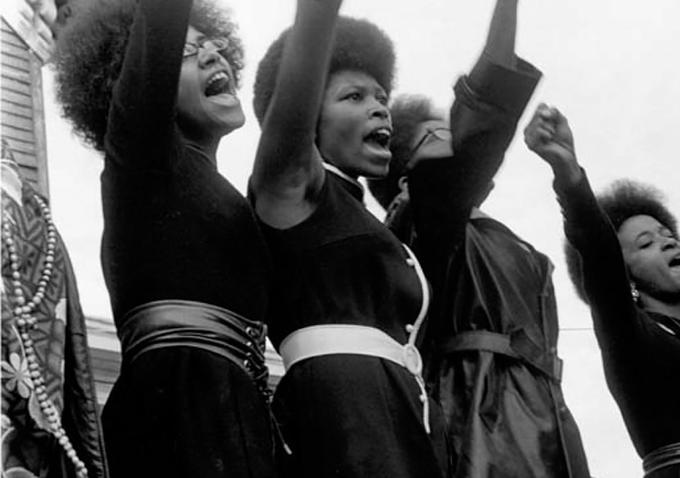
Next month, the African American Intellectual History Society will host its fifth annual conference at the University of Texas at Austin. The two-day conference will take place from March 6-7, 2020 and will feature a wide variety of panels exploring the many facets of the Black Radical Tradition. There will also be 14 university and trade presses in attendance. Many of them will have books published by conference attendees, so we encourage all to visit the book exhibit and meet with editors.
The conference will kick off on Friday with twenty-four panels that highlight some of the most exciting new scholarship on the Black Radical Tradition. One of the first winners of AAIHS’s C.L.R. James Fellowship, Crystal Eddins, will present on “Haiti as a Maroon State,” one of three papers on the Black Radical Traditions in the Haitian Experience Panel. During the second concurrent panel session, Black Perspectives Senior Editor J.T. Roane will chair a roundtable discussion on “Queer Perspectives on the Black Radical Tradition” and AAIHS Secretary Grace Gipson will moderate a discussion on “The Nuts and Bolts of Publishing a Book,” a panel featuring editors from Penn, Duke, Cambridge, and Vanderbilt University Press. There will also be an opportunity for attendees to tour the Black Studies art gallery in the Gordon White Building.
Friday’s afternoon sessions will begin with a roundtable on “Black Women’s Freedom Claims in Early America,” a panel featuring some of the leading scholars of slavery in the country, including Erica Armstrong Dunbar, Jennifer Morgan, and Jessica Johnson. Other panels Friday afternoon explore topics such as hip hop and the Black Radical Tradition, the Black Power Movement, and the intersections of Marxism and black radicalism. Additionally, the editors of the Journal of African American History—Pero Dagbovie, Derrick Alridge, and LaShawn Harris—will conduct a workshop on how to publish in the journal. The first day of the conference will conclude with keynote talk by Keeanga-Yamahtta Taylor on “21st Century Black Radicals in Search of Tradition.”
Saturday promises to be as exciting a day as Friday. That day will feature 27 panels, 2 plenaries, and a luncheon talk with Robin D.G. Kelley. Early panels on Saturday will explore topics such as “Nineteenth Century Political Thought”; “Histories of Black Trans Activism”; and “Militant Islam in the Nation and Beyond,” while sessions just before lunch will include a roundtable on former AAIHS Vice President Brandon Byrd’s new book The Black Republic and a session on “Black Women’s Internationalism and the Black Radical Tradition.” UT-Austin’s Vice Provost for Diversity and the founding chair of the African and African Diaspora Studies Department, Dr. Edmund T. Gordon, will lead two racial geography tours for attendees that address how anti-black racism, patriarchy and militarist nationalism of the New South are sedimented in the architecture, landscape, campus layout, and building names of the University of Texas.
Saturday will continue with a luncheon talk with Robin D.G. Kelley, one of the leading scholars of the Black Radical Tradition. AAIHS conference committee member Charisse Burden-Stelly will moderate this discussion and explore Kelley’s intellectual journey, groundbreaking research, and contributions to the field over nearly three decades. Two plenary sessions will follow the luncheon talk. The first of these will focus on “Religion and the Black Radical Tradition” while the second, moderated by AAIHS President Keisha N. Blain, will examine “Women, Gender, and the Black Radical Tradition.” The day will conclude with a final session featuring panels such as “Reading for Pleasure: African American Sensual History” and a roundtable on “Navigating the Academic Job Market.”
As is evident from this list of panels and events, the fifth annual conference of the African American Intellectual History Society promises to be an exciting intellectual space bringing together new and established scholars of the Black Radical Tradition. The conference committee looks forward to welcoming you all to Austin.
Click here to view the conference program.
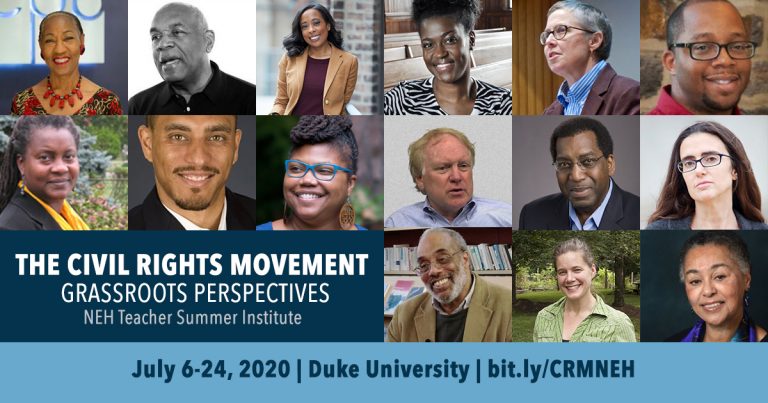
Teaching for Change is proud to partner with a team of scholars, SNCC veterans, Duke University’s Center for Documentary Studies, and the SNCC Legacy Project on a National Endowment for the Humanities (NEH) Teacher Institute, The Civil Rights Movement: Grassroots Perspectives, in the summer of 2020.
Participants (classroom teachers and school librarians in grades 5 – 12) will learn the bottom-up history of the Civil Rights Movement and receive resources and strategies to bring it home to their students. They will have the unique opportunity to learn from the people who made the Civil Rights Movement happen, and from the leading scholars of the era.
The following narratives will serve as the focus of the institute:
- The Civil Rights Movement was a primary force for the expansion of democracy for all.
- The Movement was based on the work of thousands of local “ordinary” people who both organized and sustained it.
- Women and youth were a fundamental part of the leadership and the troops of the Movement.
- The tradition of protest grew out of a long history of activism and resistance in the Black community.
- And more.
Each participant selected for this institute will receive a stipend of $2,700 to help cover travel, housing, meals, and basic academic expenses. Application deadline is March 1, 2020.
In addition to the scholars and veterans, we will be joined by Zinn Education Project curriculum writer and teacher organizer Ursula Wolfe-Rocca. Ursula has written lessons on COINTELPRO, redlining, reparations, the Depression era deportations of Mexican Americans, Standing Rock, and more. Ursula will work with the participants both during and after the institute to develop lessons based on the institute themes for their respective grade level and subjects.
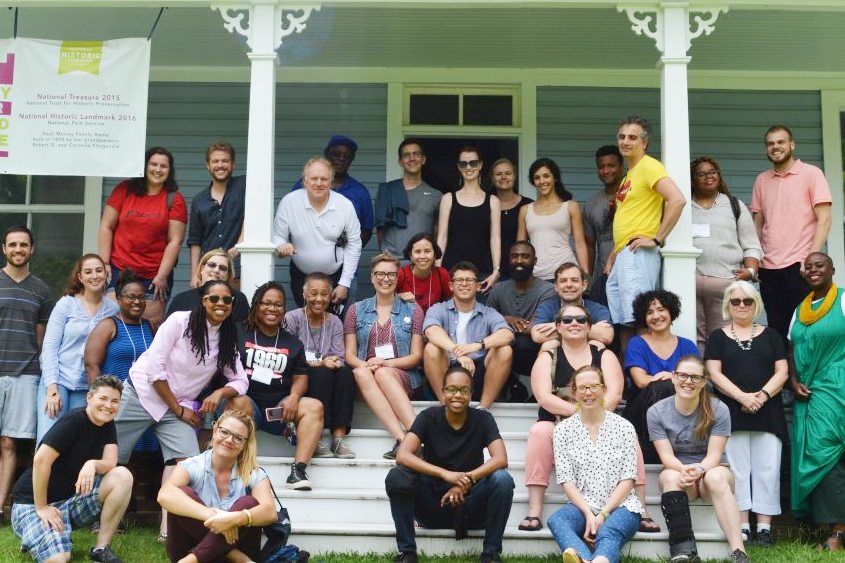
In 2018, we organized the first NEH Institute titled “Grassroots Perspectives on the Civil Rights Movement (1940-1980).” Thirty teachers came to learn from people who were active in the Civil Rights Movement and from leading scholars of the movement, including: William Chafe, Charles Cobb Jr., Courtland Cox, Emilye Crosby, Hasan Kwame Jeffries, Charles Payne, Barbara Ransby, Judy Richardson, and more. The institute was held in the Franklin Humanities Institute at Duke University. Read more. The institute was highlighted in an Edutopia article by Melinda Anderson, “A Better Way to Teach the Civil Rights Movement.”
Learn More & Apply - click here.
Teaching for Change
PO Box 73038
Washington, D.C. 20056
Email: info@teachingforchange.org
Phone: 202-588-7204
